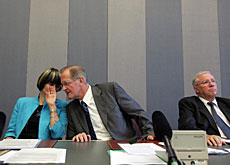Why are Swiss voters so sceptical?

There are fears the Swiss will reject a deal opening the country's labour market to the ten new EU states despite broad support on the political left and right.
On Monday the cabinet joined trade unions and business leaders calling for a “yes” vote in September, saying it would boost the economy but not damage the workforce.
The cabinet left no doubt as to its position, presenting a united front to the media on Monday.
Calling for a “yes” vote were the rightwing justice minister, Christoph Blocher – normally a Eurosceptic – the economics minister, Joseph Deiss, of the centre-right Christian Democrats, and the foreign minister, Micheline Calmy-Rey, of the centre-left Social Democrats.
The cabinet support follows that of Swiss trade unions and the Swiss Employers’ Association, and comes only two days before economiesuisse, the main business lobby, launches its official campaign in favour of the accord.
The “no” campaigners will outline their case for rejecting the treaty on Friday, led by Blocher’s Swiss People’s Party. Their campaign slogan is “Securing jobs and social welfare”.
However, it is not just Blocher who has broken ranks. About a third of People’s Party parliamentarians have said they are in favour of the accord, which gives citizens of one country the fundamental right to work in any other.
No
Yet the opponents are not to be written off. A recent poll found that 44 per cent of voters are opposed to the treaty.
They are not yet convinced that the deal will benefit the common man as much as the government claims.
“In people’s perceptions, it affects their employment situation, and particularly [increases] the risk of unemployment,” Karin Gilland Lutz, a political scientist at Bern University, told swissinfo.
“And it is perceived to have a very direct effect on salaries,” she added. “Wage dumping is a very real fear for many people, particularly in certain sectors such as the construction and tourist industries.”
Worker wave
Gilland Lutz said many Swiss workers have a vision of “a wave of people from countries with high unemployment flooding into Switzerland, prepared to work for lower salaries and worse working conditions”.
The task of the “yes” campaigners, she says, is to convince voters of the government’s commitment to enforce measures designed to protect Swiss workers once quotas are phased out in 2007 for the older 15 member states and in 2011 for the ten new members.
The bilateral treaty with the EU allows Switzerland to create a watchdog body to monitor the labour market, to stipulate minimum working and pay conditions for foreign workers and to prescribe collective labour agreements in sectors found to be abusing the system.
“If the government wants to be credible, it has to show that it is willing to take such steps and not just talk about it,” Gilland Lutz said.
She said that another factor making the outcome of the vote difficult to predict is the unique Swiss way of campaigning.
Low profile
“You expect political parties to be major actors, but they tend to take a fairly low profile, acting through committees,” she commented.
“It’s sometimes difficult for voters to know how their preferred party stands on a particular issue.
“Another factor is the ‘principle of collegiality’, which means the whole cabinet takes one position even though one or even more parties represented in the government doesn’t share that position,” she added.
“Even if they all do, the Zurich section of a particular party, for example, could take another point of view, so for voters it’s not necessarily very clear how their party stands.”
swissinfo, Dale Bechtel
The bilateral agreement between Switzerland and the EU on the free movement of people came into force on June 1, 2002.
This eases residence and working restrictions on Swiss and residents of the 15 old EU member states.
The agreement should also apply to the ten countries that joined the EU on May 1, 2004: Estonia, Latvia, Lithuania, Poland, Slovakia, Slovenia, the Czech Republic, Hungary, Cyprus and Malta.

In compliance with the JTI standards
More: SWI swissinfo.ch certified by the Journalism Trust Initiative











You can find an overview of ongoing debates with our journalists here . Please join us!
If you want to start a conversation about a topic raised in this article or want to report factual errors, email us at english@swissinfo.ch.